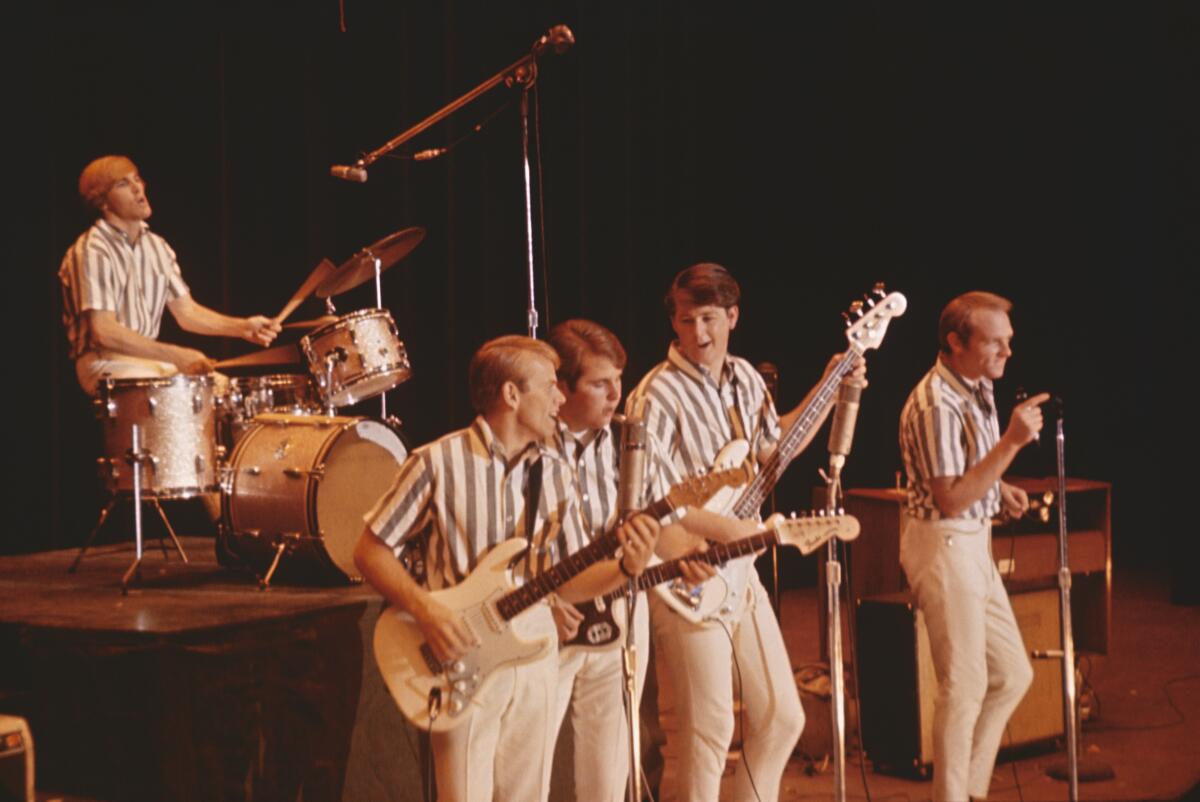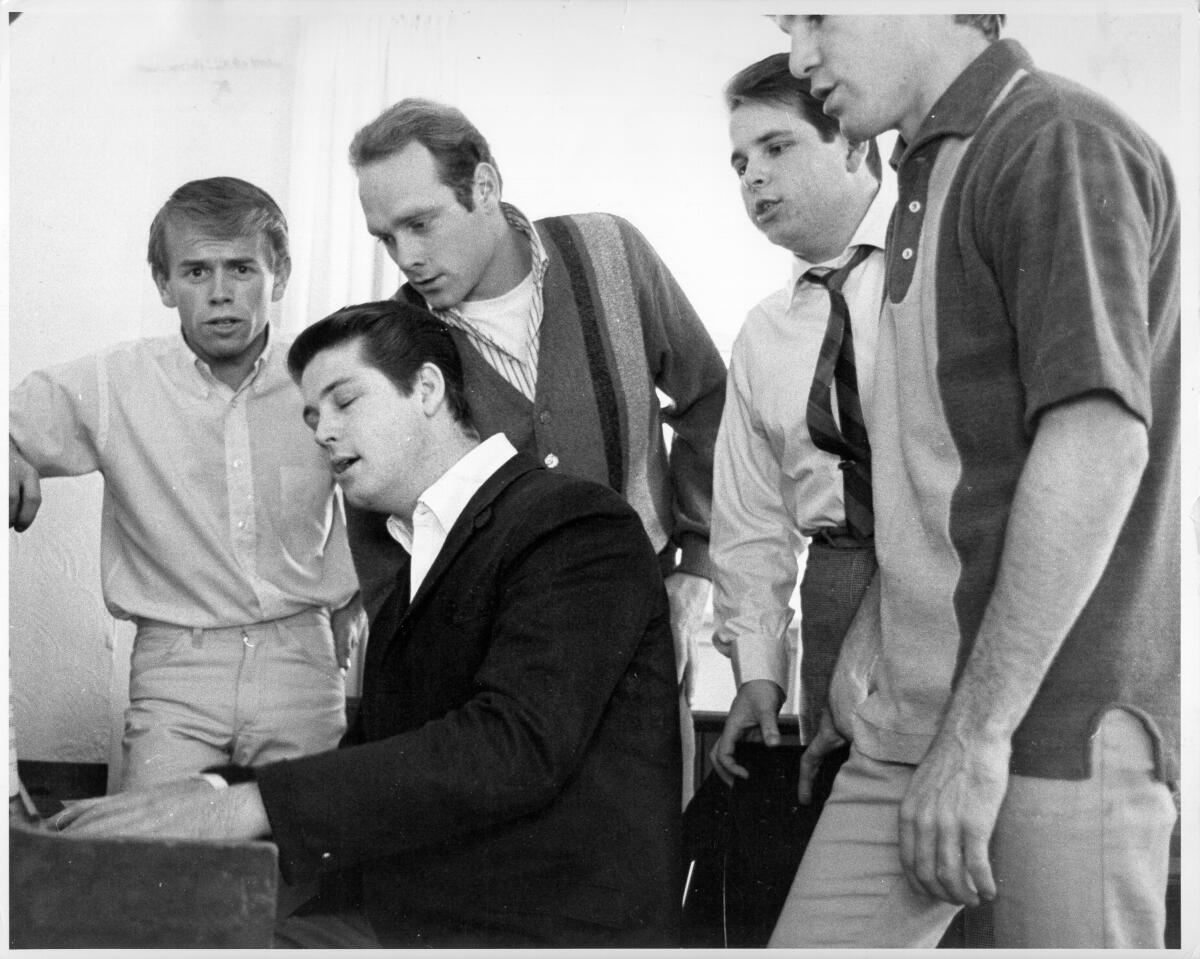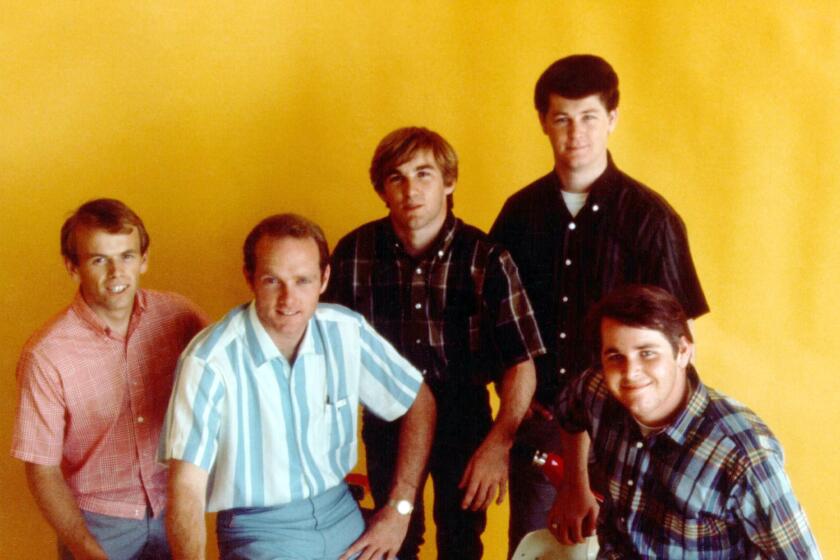Review: ‘The Beach Boys’ is a sentimental documentary that downplays the band’s squabbles

- Share via
I will (almost) always watch a film about the Beach Boys — the latest, titled simply “The Beach Boys,” premieres Friday on Disney+ — not just for the part they played in American musical and cultural history but for the part they played in my own. From 1966 to 1969 my father worked for the band, in the capacity of a tour promoter; that these were their years of lesser popularity, as rock got heavy and dour and jammy, meant that this relationship gave me no cachet among my peers. But it was interesting to me.
I saw them play, in striped shirts, white suits, colorful velours and out of costume, at the Hollywood Bowl, when the kids still screamed during their shows; at the Melodyland theater-in-the-round across from Disneyland, when they seemingly couldn’t get booked any closer to L.A.; and at the Whisky A Go Go, when “Sunflower” was released. I saw Dennis Wilson drag race; his Shelby Cobra rolled over my toe as it was being pushed to the starting line, but as much of the weight had been stripped out of the car, no damage was done. Bruce Johnston introduced me to Eric Clapton backstage at a Blind Faith concert. (“This is Eric,” he said. “Hello,” I said.) I rode for a minute in a car with Carl Wilson and his parents.
A sunny if slightly wistful new documentary about the Beach Boys charts the band’s six decades of complicated harmony.
I knew them as much as any child knows a parent’s business associates, which is to say, not at all really, but they were familiar characters, as were the support staff in the office, the studio and the road. They came together in stray bits of news and gossip, coalescing into a pantheon that floated about my life. The Maharishi, with whom the band briefly toured, gave my dad his mantra. And there was Charles Manson, of course, the ineradicable dark blot in any telling of this tale, who attached himself to Dennis looking for pop stardom. My father had moved on by the time of the Tate-La Bianca murders, but as he had once thrown Charlie out of the office — that was a moment in our house.
Directed by Frank Marshall (“Rather”) and Thom Zimny (whose documentary “Elvis Presley: The Searcher” is one of the best films about Elvis), it covers well-traveled — oft-surfed? — territory. Not even counting the scores of online videos and the all-star tributes, there’s a wealth of full-blown films about the band as a whole and of Brian Wilson, the foundation of their sound, going back decades, including three biopics: two for television — the Dennis-focused “Summer Dreams” and “The Beach Boys: An American Family” — and the well-regarded big-screen Brian young-and-old movie “Love and Mercy.”

It’s irresistible material, a show business story and a family drama, salted with child abuse, drug addiction, mental illness and recovery, a war between art and commerce and an arc of success and failure and success — when “Endless Summer,” a two-LP best-of package went to No. 1 on the charts in 1974, it catapulted the group into permanent residency as “America’s Band.” With their range of good-time rock ’n’ roll and ambitious, eccentric art-pop, they’re at once a band for everybody and a band for geeks.
Running less than two hours at a time when four-hour rock docs are not unusual, this is a swift, compact telling, with surprisingly little in the way of music and whole swaths of recording history skated over. But it looks fantastic, with a bounty of archival photographs and home movies, many of which are new to me, even as a veteran of these things. Apart from fresh interview footage with the survivors, in and around the band, and the customary pop musician testimonials, not much if anything will be new to the fans. What is new, among Beach Boys documentaries, is the tone, which does not linger on the sensational episodes and downplays the squabbling to emphasize the love.
Produced as part of the BBC “Classic Albums” series, “Beach Boys: Making Pet Sounds” has been flown transatlantically to Showtime to belatedly commemorate the 50th anniversary of an album relatively few people bought in its time but which is now widely considered a landmark of pop music.
For a group whose relations have been famously divisive, and whose story has been marked by tragedy — the early deaths of Dennis and Carl are represented only by a closing title card — it’s essentially good-natured, even sentimental. (The film checks out early in their ongoing, competitive careers, before the Beach Boys became Mike Love’s band and Brian a solo artist, and surprisingly omits their 50th-anniversary reunion tour and final studio album, the 2012 “That’s Why God Made the Radio,” which is not bad at all.) Everybody, even problematic Wilson dad Murry, gets their due. A staged but genuinely sweet closing scene may bring a tear to your eye.
Like the Beatles or the Grateful Dead, the Beach Boys are a perennial act whose influence will long outlive them. And eventually the idiosyncratic pop music they made in the late 1960s — my years in their orbit, which is to say my Beach Boys music — came to be celebrated. Few bought “Friends” when it came out in 1968, but now you can listen to a four-part podcast in which well-informed fans take it apart, tenderly, track by track, instrument by instrument, voice by voice.
More to Read
The complete guide to home viewing
Get Screen Gab for everything about the TV shows and streaming movies everyone’s talking about.
You may occasionally receive promotional content from the Los Angeles Times.








